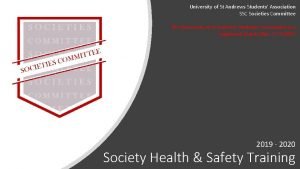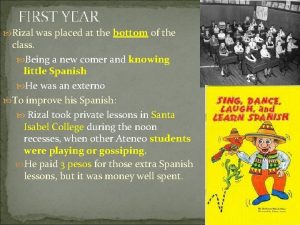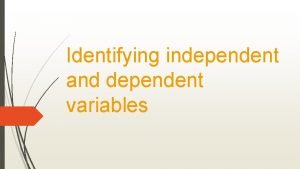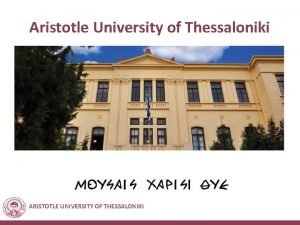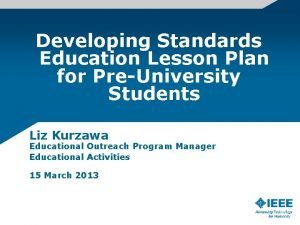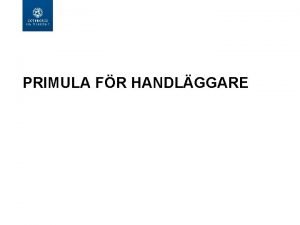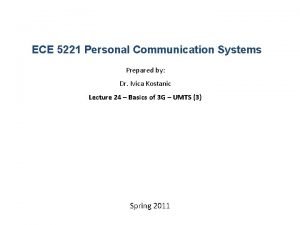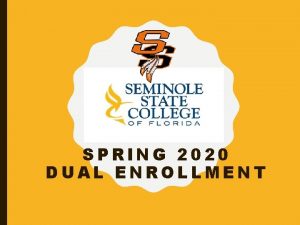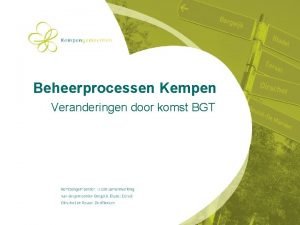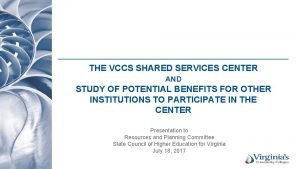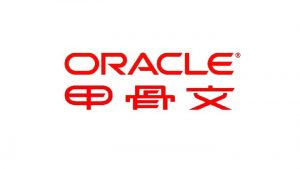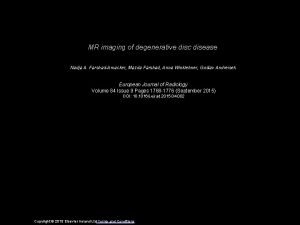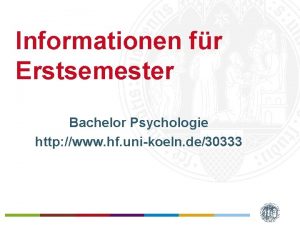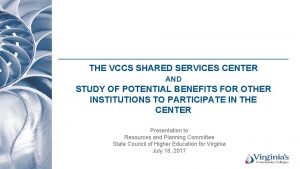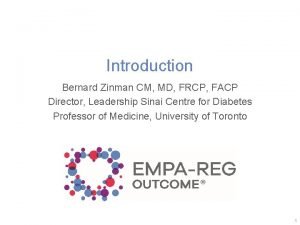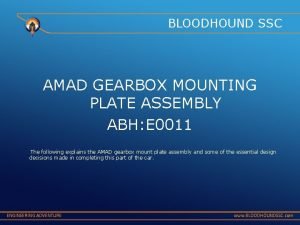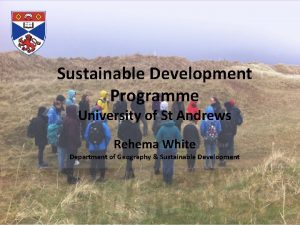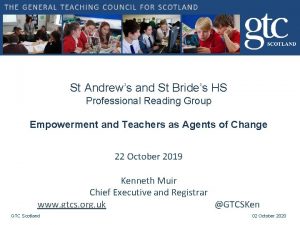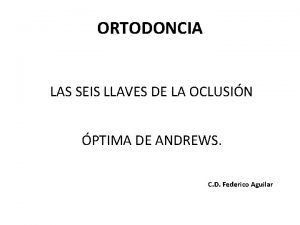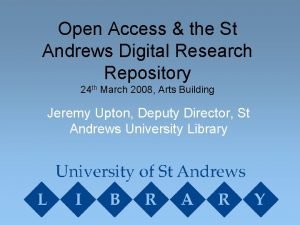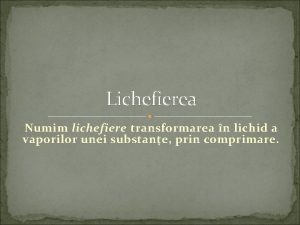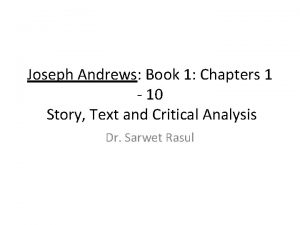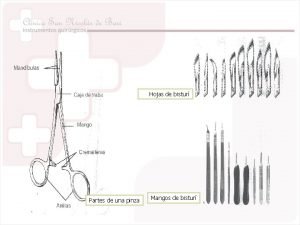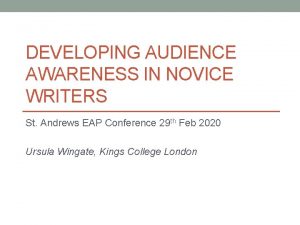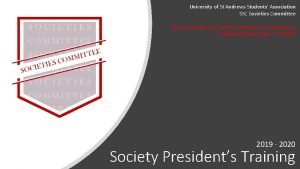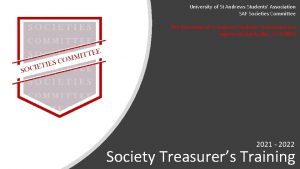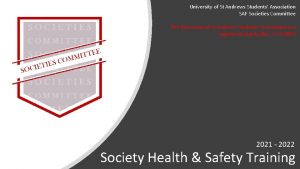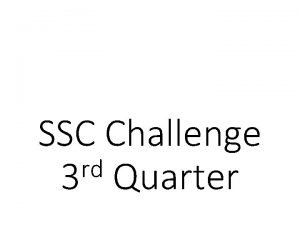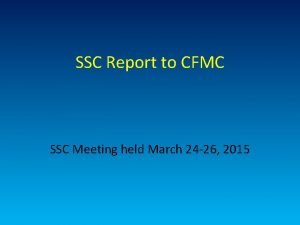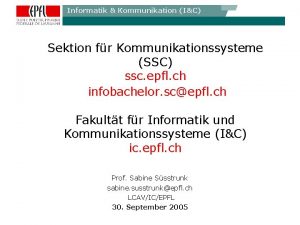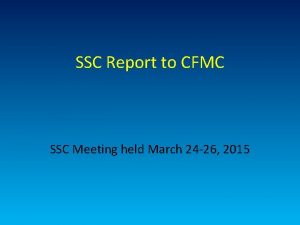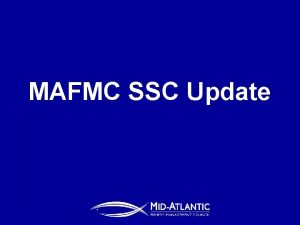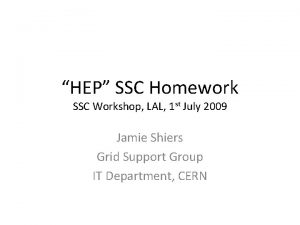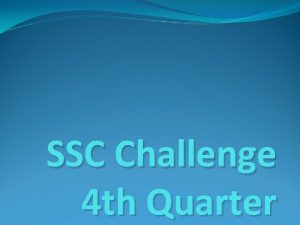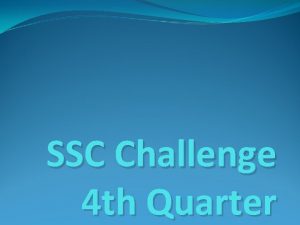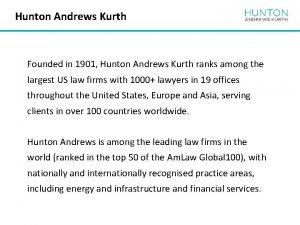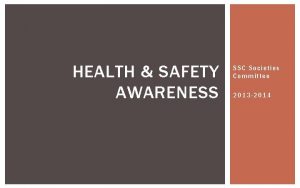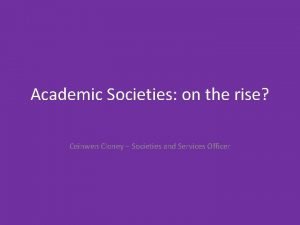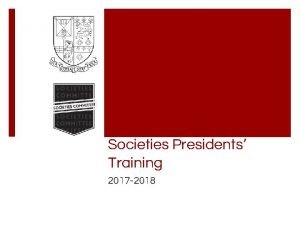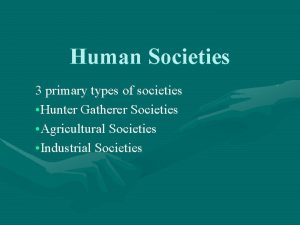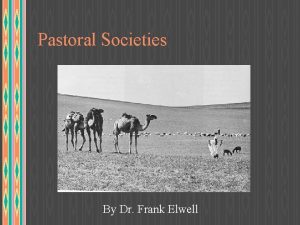University of St Andrews Students Association SSC Societies











































- Slides: 43

University of St Andrews Students’ Association SSC Societies Committee The University of St Andrews Students’ Association is a registered charity (No. SC 019883) 2019 - 2020 Society Treasurer’s Training

Introduction

Treasurer ü You are responsible for the financial management of the society. ü You and your committee are liable for any misappropriation of funds and any society debts. ü Pay attention to this training to avoid getting in trouble financially and legally.

Banking ü Societies should normally only have one bank account (including subcommittees and subgroups). ü If you have more than one bank account, you must declare them to the Cash Office. ü ü Email unionfinance@. Declare them in the re-affiliation form. ü If you would like to open another bank account, it must be approved by the Societies Committee. ü Email socs@.

Banking ü Remove old signatures and add newly elected officers as signatories! ü You should have at least 4 signatories. ü ü ü Jillian Cowan (Cash Office Management Accountant) Dave Whitton (General Manager) At least 2 of your committee members (usually President and Treasurer) ü The mandate (bank form) needs to specify that 2 signatories are required for all expenditures. ü All correspondence must be addressed to the Association. ü Know your cash book balance at all times and prevent bounced cheques.

Account Keeping

Basic Principles ü Single-Entry Bookkeeping ü ü The standard method of accountancy for societies. Income and expenditure is recorded only once in the cash book. ü Cash Book ü Consists of all cash receipts and payments for both society’s petty cash and bank account. ü In a single-entry bookkeeping system, the cash book is the principal ledger.

Cash Expenditure No Date Transaction Cash Income 1 1 Sept. 2017 Carry Over Balances £ 0. 00 2 12 Sept. 2017 Membership Fees £ 75 3 12 Sept. 2017 Tesco: Candy for Freshers' Fayre £ 10 4 13 Sept. 2017 Cash to Bank £ 50 5 15 Sept. 2017 Print Shop: Freshers Flyers (#01392) 6 17 Sept. 2017 Membership Fees 7 18 Sept. 2017 Cash to Bank 8 20 Sept. 2017 PWC: Sponsorship 9 30 Sept. 2017 Balances to Carry Over Bank Income Bank Expenditure £ 300 £ 50 £ 22. 50 £ 45 £ 150 £ 15 £ 522. 50

Records ü In addition to a cash book and all receipts, you must keep: ü Bank statements from the last 7 years of your society. ü A lockable cash box to store all cash securely. ü Cheque books (store securely) and your paying-in book.

Treasurer’s Report ü At the Annual General Meeting (AGM), the treasurer or their nominee must present a report detailing: ü ü ü Total assets at the time of the previous AGM. Total income since the previous AGM. Total income from Association grants since the previous AGM. Total expenditure since the previous AGM. Current total assets. Any debts including loans from the Societies Committee. ü Don’t worry, this is all on the AGM checklist!

Annual Audit ü Accounts are due in May every year. ü You must submit: ü ü All bank statements issued since the previous audit. Catalogued receipts for society expenditure since the previous audit. Complete record of income and expenditure (i. e. cash book). Cheque book and paying-in book. ü You must ensure that your cash box does not have more than £ 20 during the audit. ü The Cash Office may request a second audit during the academic year if your record keeping for the previous year was inadequate.

Financial Practices

Permissible Use of Society Funds ü A society’s funds belong to and are derived from the members of the society. ü A society’s funds may only be used for the benefits of the society as a whole or for the fulfilment of its aims. ü No member of the Committee may derive any financial profit or gain by reason of their participation on the Committee, including favourable rates on goods or services, unless the same benefit is available to any and all members of the Society.

Transparency and Accountability ü Society accounts must be totally transparent. ü ü They must be maintained in a standard format. They must document ALL income and expenditure. ü Societies are accountable to the Association and their members for their financial practices. ü Accounts must be updated regularly and made available upon request of the Association or society members.

Cash Management ü Cash may only be handled by those authorised to do so. ü Cash boxes are insured for up to £ 200. ü Cash outside of your box is not insured. ü Never keep more than £ 200 in your cash box for more than 1 day. ü The Cash Office can provide floats (change). ü The Association can provide secure storage for your cash box overnight or weekends if the balance is more than £ 200.

Reimbursements ü Payment should be made by cheque whenever possible because they are more trackable. ü Purchases made from local businesses may be paid from petty cash. ü For online purchases, you can use the Cash Office’s credit card and write a cheque to the Association.

Fixed Assets ü A fixed asset is a tangible piece of property that a society does not expect to be consumed or sold within one year. ü Societies must seek the permission of the Director of Student Development and Activities (dosda@) to sell or otherwise dispose of a fixed asset if purchased with Association funding. ü High value assets may be insured by the union at the discretion of the Management Accountant. ü Email unionfinance@.

Charitable Donations ü All charitable donations MUST be processed through the University of St Andrews Charities Campaign. ü ü Failure to do so will result in penalties. The donation will still come from your society while also counting towards the Charities Campaign’s fundraising totals. ü Speak to the Charitable Societies Coordinator (charitysocs@) for donations outside of the Campaign framework for emergency relief campaigns. ü If you are a charitable society, there will be a Charitable Societies Roundtable in September.

Budgeting

Budgeting Principles ü As a treasurer you need to protect your society’s money and oversee financial expenditure. ü You should have a budget for every event to ensure they are viable. ü INCOME ü ü Do NOT overestimate income. Income should be projected from past events, don’t be overly optimistic. Ensure that any sponsorship is guaranteed and available, not just promised. Securing cash-flow loans is not recommended. Such loans make the society dependent on the success of the event.

Budgeting Principles ü EXPENDITURE ü ü ü Include ALL expenditure in your projections. Budget for a 10% contingency overrun on ALL expenses. Include VAT. ü Assume, for the purposes of budgeting, that the society will continue to exist and operate indefinitely. ü While the society may subsidise an event, it may not jeopardise the financial future of the society.

Good Practices in Budgeting ü Do not budget to “break even”. ü Budget to gain at least a small surplus to avoid a deficit. ü Create budgets for all events and activities throughout the year and stick to them as nearly as possible. ü Do not wander into a financial commitment without a plan. ü Preparing a budget is also an essential part of applying for funding from the Union for an event.

Funding

Sponsorship ü Societies can look for external funding. ü This may come from: ü ü ü Schools within the University. Local businesses. External companies and organisations. ü Go to the Cash Office to review any sponsorship agreements / contracts with external companies before signing in order to ensure you get a good and fair deal!

Societies Committee Grants ü The Societies Committee has a budget of £ 35, 000 to grant to affiliated societies. ü This money comes from profit in the Union (bars, Rector’s, fayres…). ü This is why when we fund an event we ask you to use Union services where possible. ü We have the funds so APPLY FOR GRANTS! ü https: //www. yourunion. net/activities/societies/runningyoursociety/grants/

Applying for Societies Grant 1. Download the form from the Union website. 2. Email the completed form to socgrant@ and go to the Societies Committee Office Hours to talk through the grant. 3. Send a risk assessment for your event to unionra@. 4. The Societies Committee reviews grants every Wednesday. If your grant is above £ 500, you might be asked to present the grant to the committee. 5. You will hear back by Friday of the same week. If you get a grant, you will receive a Grant Receipt via email. 6. The society president or treasurer must sign off on the Grant Receipt. 7. To claim your grant, just present receipts and the Grant Receipt to the Cash Office.

The Grant Form

The Grant Form

The Grant Form

The Grant Form

The Grant Form ü When writing about the merit of your society event, consider the following: ü ü Town-Gown Relations Benefit to the University Academic Relevance University and Students’ Association Reputation ü ü ü Charitable Benefits Cultural Enrichment Health, Wellbeing and Welfare ü Be sure to demonstrate to the Societies Committee how the event will be valuable for your society!

The Grant Receipt

Societies Committee Loans ü Any society may apply for a loan to meet temporary cash flow needs. ü The loan shall be interest free, provided that the loan is repaid in full by the date specified. All loans are generally to be repaid in a single instalment. ü A society’s committee has to vote to authorise their treasurer to apply for a loan. ü Outstanding loans have to be reported at AGMs and to new members before paying membership fees. ü If a loan is not paid back, the executive committee of the society is liable for the debt and may be referred to the SSC Discipline Committee.

Anti-Fraud Practices

Anti-Fraud Principles ü The officers of societies have a duty to prevent fraud. ü Fraud includes: ü ü Embezzlement of society funds. Misappropriation of society funds. Filing grant applications based on wilfully false or misleading information. Any deceit used to gain a dishonest advantage. ü Societies must develop internal control procedures to remove the opportunity to commit fraud. ü Fraud allegations are pursued and investigated internally, civilly, and criminally.

Good Practices ü Update your records immediately after an event or as soon as you are given a receipt. ü Ensure that the appropriate officers / committee authorise and are aware of all expenditures. ü Retain all financial records. ü Review financial transactions frequently and ensure that all transactions appear appropriate. ü Try to use cheques for payment where possible.

Reporting Fraud ü IMMEDIATELY REPORT ANY SUSPICIOUS TRANSACTION OR ACTIVITY TO THE CASH OFFICE! ü The Association can investigate the accounts and practices of a society to prevent fraud, but only if the matter is raised to our attention. ü Allegations will be handled confidentially.

Email Fraud Threats ü Affiliated societies have been targeted for Email Fraud ü The criminals pretend to be one of the exec, emailing (usually) the treasurer, demanding urgent payment to a third party. They will include a bank account and sort code ü This is a real example of the type of email that societies have received; ü ü “{treasurer’s name}, I need you to initiate a payment of £ 2, 100 now, get back to me if you are available” When questioned, this comes through: ü “I am in a meeting now. It's a payment to a vendor for an outstanding payment for purchase, supporting document will be sent across to you before the end of the week. It has to go out now. Will send you the beneficiary details in my next email. ”

Email Fraud Threats ü If you see this sort of request and you are unsure, wait until you can verify it – ideally face to face with the person, or over a phone number that you already have. ü Only reply to known email addresses (it may look like the right address, double check). ü Don’t give out extra information (only …. can deal with that, we only allow payments up to…. ). ü Report such attempts to phishing@.

Summary

Core Responsibilities ü Keep a cash book record, including details and proof of all expenditure and income. ü Keep all bank statements for the past 7 years. ü Ensure the cash box and high value assets are insured appropriately. ü Check society pigeon holes for post and bank statements. ü Submit accounts for annual audit. ü Present on Yearly Financial report at the AGM. ü Budget for all events. ü Pursue sponsorship and Societies Committee grants.

Last, But Not Least ü Please get in contact with any questions or problems! ü Director of Student Development & Activities – dosda@ ü Societies Officer – socs@ ü Grants Officer – socgrant@ ü Jillian Cowan – Management Accountant (Cash Office) – jc 82@ ü Societies Committee Office Hours – Mondays 4 -6 pm in Main bar ü APPLY FOR GRANTS!

Treasurer’s Assessment Slides: bit. ly/treasurer_slides
 ü
ü Richard davidson andrews university
Richard davidson andrews university Jose rizal first favorite novel
Jose rizal first favorite novel Students at a university were split into two groups
Students at a university were split into two groups Personal development plan for university students
Personal development plan for university students Aristotle university of thessaloniki international students
Aristotle university of thessaloniki international students Pre university students age
Pre university students age Education is not mere bookish knowledge
Education is not mere bookish knowledge Ssc coaching in noida sector 62
Ssc coaching in noida sector 62 Gap filling without clues
Gap filling without clues Primula ssc
Primula ssc 01 ssc 2341
01 ssc 2341 01 ssc 5221
01 ssc 5221 Ssc dual enrollment
Ssc dual enrollment Suniel pancham
Suniel pancham A ship without a rudder right form of verb answer
A ship without a rudder right form of verb answer Objectives of teaching economics in ssc board
Objectives of teaching economics in ssc board Ssc de kempen
Ssc de kempen 01 ssc 1555
01 ssc 1555 Shared services vccs
Shared services vccs Oltp数据库
Oltp数据库 Ssc logo
Ssc logo 01 ssc 1569
01 ssc 1569 01 ssc 1776
01 ssc 1776 Bachelor psychologie köln
Bachelor psychologie köln Best ssc coaching in varanasi
Best ssc coaching in varanasi Vccs shared services
Vccs shared services 01 ssc 8562
01 ssc 8562 Ssc germanistik
Ssc germanistik Gbs vs ssc
Gbs vs ssc Uwo ssc
Uwo ssc 01 ssc 2333
01 ssc 2333 Bloodhound ssc
Bloodhound ssc St andrews sustainable development
St andrews sustainable development St andrews and st brides high school
St andrews and st brides high school Chris andrews northwestern mutual
Chris andrews northwestern mutual Curva de spee plana
Curva de spee plana St andrews thesis repository
St andrews thesis repository Lichefiere
Lichefiere Joseph andrews course hero
Joseph andrews course hero Donald cullivan
Donald cullivan Separador de murphy
Separador de murphy Manobra brandt andrews
Manobra brandt andrews Stance markers
Stance markers
